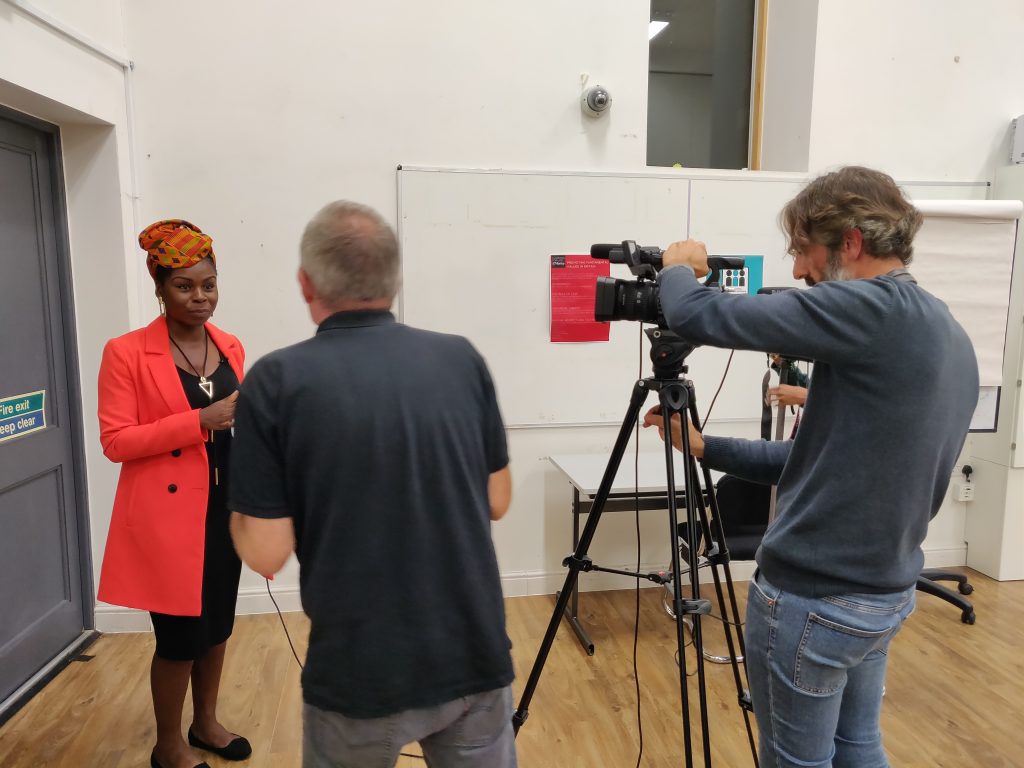We are delighted to announce that Spectacle CIC has received funding from the National Lottery Community Fund to restart the Silwood Video Group with an archive-based film project.
Since 2001 Spectacle has worked with the Silwood Community in Lewisham and Southwark setting up the Silwood Video Group. Spectacle has run over the years hundreds of video workshops documenting daily life and changes created by regeneration. The collaboration has resulted in many short films published in DVDs, added to a few web episodes in the Channel 4 series Unteachables, an ICA exhibition, as well as further exhibitions at the Musee du Beaux Arts in Brussels.
The National Lottery grant allows members of the Silwood community to gather together around the video documentation that has been produced during the regeneration of the estate, aiming to revitalize the Silwood Video Group and equip the community to make use of video archive and video tools to reflect on their own history and future. Spectacle is running a series of online workshops, watching back and commenting together on what were the issues documented by the Silwood Video Group in the early 2000s. The project culminates in a workshop on the Silwood estate to collect oral histories and reflect on how to use the video archive to support the local community.
The Project
The Lottery funding has allowed us to re-start the Silwood Video Group, initially in an online setting through an archive-based film project.
Putting the Silwood Archive online has been an aim for many years. Spectacle has been uploading archive selections for the community to watch and discuss online. If you want to watch the available archive, sign up HERE.
Meeting every Thursday at 7, the SVG group watches selections from the archive and discusses the material, drawing out themes and topics of interest. If you would like to join this meeting, please sign up and we will send you the Zoom link. This is leading up to meeting in person with up to 12 participants to record oral histories in the community and add new perspectives on the archive.
Our Archive-based video project aims to bring together a variety of different groups and generations of the Silwood Community to review and add new oral histories to the Silwood Video Archive. We hope participants will build community bridges, connect to the past, engage in creative practice, and learn filmmaking skills.

We are very excited to be providing a space where isolated members of the Silwood Community can come together in a fun and educational environment to talk about history and film.
Archive-based Participatory Film Projects
Spectacle CIC is very excited about the tool of archive-based film projects. We see that they have the power to reduce loneliness by bringing people together, creating connection through shared creativity and learning, and anchoring residents within their own history.
Silwood Community video workshops, from the archive
These workshops foreground the wisdom of an older generation that is too often sidelined and isolated, while also sparking the joy in technology of younger generations. They offer an outlet for art and creativity in connection with others, as well as skills for future employment. It enable older community members to pass on knowledge to younger members or newcomers, and offer practical tech literacy and filming skills to participants.
Silwood Video Group and the Future
For 20 years, the Silwood Video group has built relationships across generations, ethnicities, and cultures through filmmaking. This extraordinary and unique group has been open to anyone in the community and in that time has benefitted approximately 200 people aged 6-70 constituting an unusually diverse range of people in terms of race and religious background.
Spectacle’s relationship with the Silwood community stretches back 20 years. Spectacle created the Silwood Video Group because the community wanted to have a voice in the proposed regeneration plans for their community. Placing the tools of filmmaking in the hands of the community empowered people to actively shape the future of their community through media activism.
The idea for this archive project is based on the community’s desire to reconnect with the places that existed before the regeneration. Many are getting older, and they want to share their stories with their grandchildren. They also see it as a good opportunity to build connections with newcomers to the community who don’t know about it’s history.

The Silwood Archive project is supported by The Audience Agency’s Digitally Democratising Archives project thanks to funding from DCMS and the National Lottery, as part of The National Lottery Heritage Fund’s, Digital Skills for Heritage initiative.



This work is licensed under a Creative Commons Attribution 4.0 International License.
Except where noted and excluding company and organisation logos this work is shared under a Creative Commons Attribution 4.0 (CC BY 4.0) Licence
Please attribute as: “Silwood Archive Project (2022) by Spectacle Media CIC supported by The National Lottery Heritage Fund, licensed under CC BY 40

